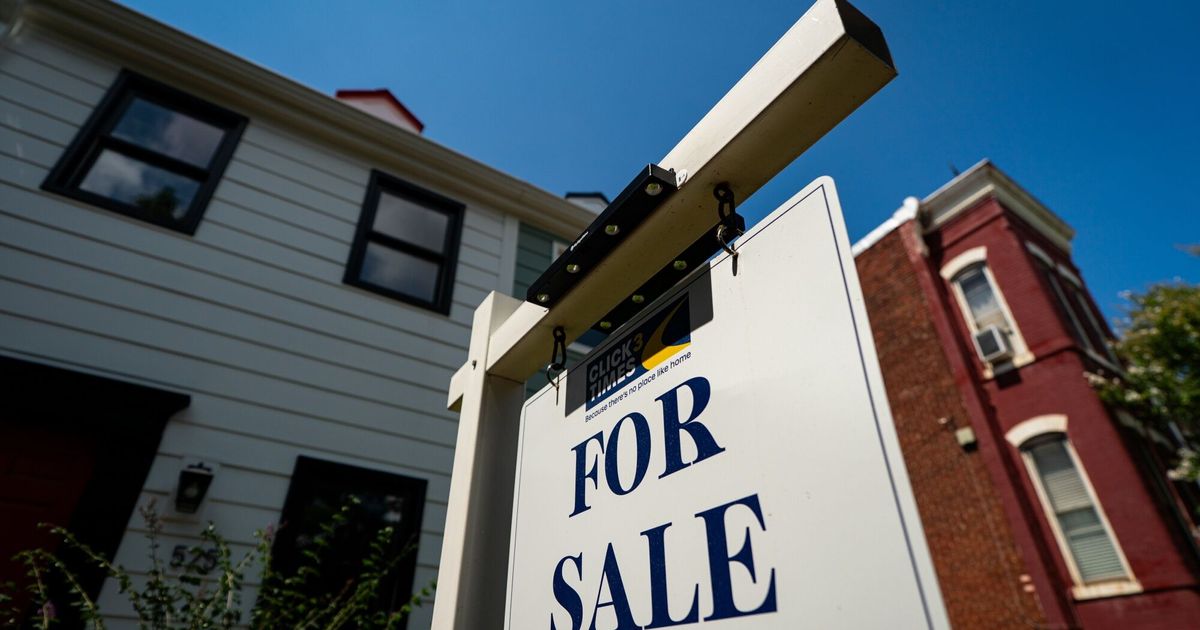PARIS — The two-bedroom penthouse comes with sweeping views of the Eiffel Tower and just about every other monument across the Paris skyline. The rent, at 600 euros a month, is a steal.
Marine Vallery-Radot, 51, the apartment’s tenant, said she cried when she got the call last summer that hers was among 253 lower-income families chosen for a spot in the l’Îlot Saint-Germain, a new public-housing complex a short walk from the Musée d’Orsay, the National Assembly and Napoleon’s tomb.
“We were very lucky to get this place,” said Vallery-Radot, a single mother who lives here with her 12-year-old son, as she gazed out of bedroom windows overlooking the Latin Quarter. “This is what I see when I wake up.”
Public housing can conjure images of bleak, boxy towers on the outskirts of a city, but this logement social was built in the former offices of the French Defense Ministry, in the 7th arrondissement, one of Paris’ most chic neighborhoods. It’s part of an ambitious and aggressive effort to keep middle- and lower-income residents and small-business owners in the heart of a city that would otherwise be unaffordable to them — and by extension, to preserve the ineffable character of a city adored by people around the world.
This summer, when the French capital welcomes upward of 15 million visitors for the Olympic Games, it will showcase a city engineered by government policies to achieve mixité sociale — residents from a broad cross-section of society. One-quarter of all Paris residents now live in public housing, up from 13% in the late 1990s. The mixité sociale policy, promoted most forcefully by left-wing political parties, notably the French Communist Party, targets the economic segregation seen in many world cities.
“Our guiding philosophy is that those who produce the riches of the city must have the right to live in it,” said Ian Brossat, a communist senator who served for a decade as City Hall’s head of housing. Teachers, sanitation workers, nurses, college students, bakers and butchers are among those who benefit from the program.
Making the philosophy a reality is increasingly hard — the waitlist for public housing in Paris is more than six years long. “I won’t say this is easy and that we have solved the problem,” Brossat said.
Paris is being buffeted by the same market forces vexing other so-called superstar cities such as London, San Francisco and New York — a sanctum for the world’s wealthiest to park their money and buy a piece of a living museum. The average price for a 1,000-square-foot apartment in the center of the capital today is 1.3 million euros (about $1.41 million), according to the Chamber of Notaries of Paris.
The Fondation Abbé Pierre, an influential charity, was unusually emphatic in its annual report, published in February, calling France’s affordability crisis a “social bomb,” with rising homelessness and 2.4 million families waiting on public-housing applications, up from 2 million in 2017. Still, the measures that Paris has taken to keep lower-income residents in the city go far beyond the initiatives in most other European cities, not to mention American ones.
Every Thursday, Jacques Baudrier, the Paris city councilor in charge of housing, scrolls through the list of properties being exchanged by sellers and buyers on the private market. With some exceptions, the city has the legal right to preempt the sale of a building, buy the property and convert it to public housing.
“We are in a constant battle,” said Baudrier, who wields a 625 million euro annual budget.
The fight, he said, is against forces that make buying Parisian real estate impossible for all but the well-to-do, including buyers who snap up apartments as pieds-à-terre and then leave them empty for most of the year. Paris has also sharply restricted short-term rentals, after officials became alarmed when historic neighborhoods, including the old Jewish quarter, the Marais, appeared to be shedding full-time residents as investors bought places to rent out to tourists.
At the same time, the city has built or renovated more than 82,000 apartments over the past three decades for families with children. Rents range from 6 to 13 euros per square meter, depending on household income, meaning that a two-bedroom, 1,000-square-foot apartment might go for as little as 600 euros ($650) a month. It has also built 14,000 student apartments over the past 25 years; monthly rents at one complex currently nearing completion in the 13th arrondissement start at 250 euros a month.
For City Hall, social engineering also means protecting the petits commerces, the small shops that contribute to the city’s sense of timelessness. When visitors meander through what seems like a series of small villages, with boulangeries, cheese shops, cobblers and mom-and-pop hardware stores, it is not entirely organic.
City Hall has a direct hand in the types of businesses that take root and survive in Paris because it is the landlord, through its real estate subsidiaries, of 19% of the city’s shops. Nicolas Bonnet-Oulaldj, the city counselor who oversees the city’s commercial landholdings, said his office is constantly studying neighborhoods to maintain a balance of essential shops and limit the number of chains, which can usually pay higher rent.
“We don’t rent to McDonald’s, we don’t rent to Burger King and we don’t rent to Sephora,” said Bonnet-Oulaldj. He acknowledged that in some neighborhoods where private landlords have rented to chains, the battle has been plainly lost.
The city is deliberate in what shops it chooses. In an area that had become thick with hairdressing salons, City Hall rented to a bakery and a cheese shop. In other neighborhoods, it has chosen to rent to bicycle repair shops, in part to reinforce the city’s push to reduce the number of cars in favor of bikes. It doesn’t rent to massage parlors on the grounds that they are sometimes fronts for prostitution.
A few minutes from the Place de la Bastille is one of the beneficiaries of the city’s retail policies. Emmanuelle Fayat, a luthier who restores and services violins for orchestra musicians, sits surrounded by maple and spruce and the tools of her trade: neatly organized rasps, planes and chisels. She rents her shop for “a modest amount” from a city-owned real estate management company.
“I have no knowledge of marketing and I’ve never asked myself how to become rich,” Fayat said on a recent afternoon. “I just want to do my job. I like my profession more than money.”
About a mile away, in a neighborhood rich with cafes and restaurants, Librairie Violette and Co, a feminist and lesbian bookshop, is another beneficiary of Paris’ retail diversity program. When the bookshop’s previous location was bought by an insurance company and the original owners retired, a group of women who wanted to keep the business going struggled to find a new home and announced they were closing the store.
City officials reached out and offered a new space at below-market rates. “Banks refused to lend us money,” said Loïse Tachon, a co-manager of the shop. “They didn’t think it would be lucrative enough.”
Farther north, near the Buttes-Chaumont park, the city rents a storefront to Desirée Fleurs, which specializes in flowers grown in the Paris region. Audrey Venant, the co-founder of the shop, sees the program as a necessary and protective guiding hand.
“Local businesses are very, very fragile,” she said, surrounded by narcissus, ranunculus, snapdragon, all perfumed by eucalyptus. “I see a lot of bankruptcies.”
Venant and her husband, a painter and sculptor, live in a 750-square-foot loft that is also part of the city’s public-housing program. Her monthly 1,300-euro rent is well below market rates, she said.
The French statistics agency, Insee, reports that Paris is home to more than 10,000 nurses, 1,700 bakers, 470 butchers, 945 garbage collectors and 5,300 janitors. The push for more social housing and other programs to make the city more affordable has coincided with the dominance of left-wing political parties, who came to power in 2001 after decades of right-wing rule.
But François Rochon, an urban planning consultant, said there is a functional consensus between right and left in France today on the need for public housing that mirrors some other European nations, but not the United States. “Living in social housing is not stigmatized,” said Rochon, who pointed to its roots a century ago in France, when companies built apartments for their workers.
As a measure of the left-right alignment on the issue, Benoist Apparu, a former housing minister who served in a conservative government, described social housing as “absolutely essential.”
“A city, if it’s only made up of poor people, is a disaster,” said Apparu, who now works for a property developer. “And if it’s only made up of rich people, it’s not much better.”
Paris’ housing program is part of the trade-off of the welfare state: affordable health care and education in exchange for some of the highest income tax rates and social charges in Europe. Public housing, however, is increasingly available only for those lucky enough to get it.
There also is vestigial cynicism in Paris about public housing after a series of scandals in the 1990s, when some conservative politicians were revealed to be paying cheap rents for luxury city-owned apartments. Today, the city awards public housing through a system that strips the names of applicants and prioritizes them through a points system that factors income and family circumstances.
Mostly, resistance comes at the local level, Rochon said. Residents in central arrondissements, for example, have often pushed back against building public housing, and the neighborhoods remain bastions of the wealthy. There is also disagreement about how far the government can or should push public housing in the future. The current goal is for Paris to have 30% public housing for low-income residents and 10% for middle-income residents by 2035.
Baudrier, the Paris City Council member, said he believes that in the long term, 60% of housing in the city should be public and reserved for low- and middle-income families.
But building new public housing has been particularly challenging because so much of the city is already so densely packed — and often protected by landmark status.
City planners have negotiated with the public railways to buy old train yards and rights of way. They’ve also seized on opportunities like the one that arose in 2018, when the French Defense Ministry consolidated its offices in Paris and the city negotiated to buy the l’Îlot Saint-Germain for well below market rates. The ensuing construction of 253 apartments was financed by the sale of part of the building to a Qatari investment fund, which is building a luxury hotel, as well as low-interest government loans that have durations as long as 50 to 80 years, according to Emmanuelle Cosse, a former housing minister.
City Hall has also taken over condemned buildings. Fabrice Chaillou, a father of two who manages computer networks, lives in public housing on the northern edge of Paris that was built from the ruins of a dilapidated neighborhood. He pays 980 euros a month for a three-bedroom apartment that he waited 10 years to get. Among his neighbors are a janitor, teachers, a car salesperson and a police officer.
The program has allowed Chaillou and his wife to raise their two boys in the city. But he knows that the future of social housing will always face at least one big challenge: “The problem is that once you get in, you never want to leave.”
















